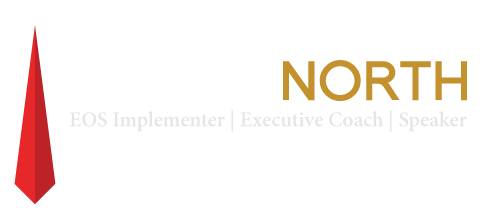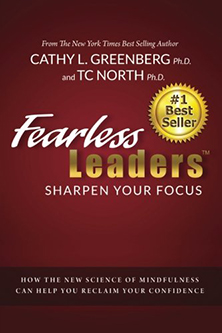Changing one word can increase your confidence when performing under pressure.
How to build confidence? When performing under pressure during the most important moments in your life, could changing one word of your self-talk increase your confidence? Could changing one word dramatically increase the probability of success?
That’s what researcher Ethan Kross, Ph.D., found when studying the difference between self-talk that used first-person versus self-talk that used second-person when under pressure. Changing one word helped people be their best under stress.
You frequently talk to yourself quietly in your mind, whether or not you notice it. Your self-talk reflects your thinking, and it’s continually programming your mind.
Imagine an important situation coming up in your life when you want to perform your best under stress. Possibly leading an important meeting, interviewing for a new job, taking a test, speaking in public or engaging in a difficult conflict-resolution process. What self-talk do you notice in that situation?
Kross used magnetic resonance imaging (MRI) to study what happens in your brain under stress using first- or second-person self-talk. He also studied the outcomes of people performing under pressure using either first- or second-person self-talk. The differences are profound.
For the best confidence-building technique I know, click here.
Difference between first- and second-person self-talk.
First-person self-talk begins with the pronoun “I.” Examples of first-person self-talk include, “I got this!,” “I can do this!” and “I’m ready!”
Examples of second-person self-talk for me include, “You can do this; you rock!,” “You got this; let’s go!,” “You’re ready!” and “TC, you prepared really well for this!”
Either watch the video or read the transcript below and learn how changing to second-person self-talk in high-pressure situations positively changes your emotions, confidence and probability of being successful when performing under pressure. It’s fascinating.
[vc_video link=”https://youtu.be/yimvrhOzMY8″]
Kim: Hi I’m Kim Tracy with the Maxwell James Speaker Agency. So excited to be back with Dr. TC North. We are continuing an exceptional series on how to build confidence. Thank you so much for doing this.
TC: You’re welcome. I love this series with you Kim. Today is going to be a really awesome one. I’m so excited. This is pretty new research. Neuroscience can study the brain in ways that we haven’t’ been able to up until recently. Today we’re going to talk about how you change ONE WORD of your self-talk and under stressful situations it really changes your level of confidence, and it changes your level of performance.
Kim: So, can you tell the audience that’s watching this – what did we discuss previously in the first video?
TC: The first video was just a reminder that this is all about the general self-confidence aspect of power in mindful power. Confidence (and how to build confidence) is an important part of mindful power, which is the bigger topic here.
This is the second in our series of confidence and the tip we left for everyone in the first video was, you only have 100 percent control of two things – your thoughts and your actions. So self-talk is a form of thought and it’s one of the two things you have 100% direct control of. But most of us don’t control it.
The reality is, no matter how good you get at controlling your self talk, you’ll never be perfect at it. It’s a totally imperfect process but you can make tremendous strides.
Kim: Excellent. So you’re saying that today you just need one word to change to be your best under pressure. You know that people are salivating right now, TC? They’re like, “give me the word!”
TC: You have to build it up a little bit, there needs to be suspense!
Kim: He’s a tease you guys!
TC: I was a scientist, remember? It’s always the conclusion at the end not like journalism articles that starts with the conclusion.
Let’s talk about how to build confidence by how you talk to yourself and what is the one word or concept that you can change? So, first of all, are you aware that you talk to yourself?
Kim: yes!
TC: And do you say some pretty crazy things? You don’t have to answer that Kim.
Kim: I hope so [laughter]!
TC: We all talk to ourselves and we talk to our selves in our heads faster than we can actually talk like this (out loud). When we talk like this (out loud) with each other it’s about 120 words a minute. But some people have estimated we can talk to our self as fast as maybe three, four maybe even five hundred words a minute. And every thing that goes through our head is literally being programming to own sub-conscious or conscious mind. So learning to become aware of that (our thoughts and self-talk) and then learning to control it is really critical.
Kim: So I want you to give the viewers this quote from Psychology today because I think that it’s really important.
TC: Alright, so in the May/June edition of Psychology Today wrote, “Inner talk is one of the most effective and least utilized tools to master the psyche and foster life success.” And I have to admit they made a big deal out of this and for the thirty years of my practice people in my space have been doing this for that whole time, it’s basic to how to build confidence!
I’m thinking, “Oh my gosh, I love Psychology Today. I read it religiously and phew, they’re way behind the times on this!”. It is true, so I’m glad they’re talking (writing) about it but, again people in my space have been doing this for a long, long time. It’s very powerful and learning how to do it correctly is very powerful. People don’t really understand how to maximize the use of their own self-talk.
Kim: Ok. So we’re talking about stressful situations. I’m going to call it the “TC Tip Line”. What do we do?
TC: I’m going to jump to the research to answer that question if I may. A scientist by the name of Ethan Kross, Ph.D. did MRI brain imaging studies to look at what part of your brain you use when you talk with the first person. First person is an, “I” statement. If I’m in a stressful situation and I’m getting really nervous I might say, “I can do this. I’m ready. I’m prepared. I’ve got this!”. Those are all “I” statements and use what’s called the mid-brain which is where the emotional brain is, the limbic system, the amygdala and that’s the fear center.
So when I’m under stress, if I’m using “I” statements I’m literally doing it out the fearful part of my brain. If you switch, this from “I” to “you”, or use your own name you literally change which part of the brain you’re using. Now you’re using the cerebral cortex or even the pre-frontal cortex which is logical brain, it’s not emotional and that’s the part of your brain you want to be in when you’re under stress.
You don’t want to be in your emotional brain because that’s what can get out of emotional control. So to use that same example, if I’m feeling nervous and I’m about to go out on stage and I can say, “You got this TC. You’re prepared. You’re ready. Let’s go”. See? That’s a whole different part of the brain, now I’m up here in my brain rather than that mid-brain. It’s just very different.
Kim: Ok. So talk to me more about Kross’ research findings. First person self-talk in stressful situations. What actually happens?
TC: The result of what happens is people actually get anxious and they perform badly. Now remember this is under high stress situations, this isn’t every-day normal stress. If you use the second person your probability of success actually dramatically increases. The level of rumination and worry decreases. Your conscious awareness of yourself and all around you increases, which is very valuable. It literally allows your brain to be it’s best because it’s got this higher functioning part of the brain involved.
Kim: So, why? Enlighten me.
TC: The result is literally because you’re using a different part of your brain. And you’re using the logical, thought-centered part of your brain, this part up here, the more advanced part. You’re not in that spiral of emotions. This is how to build confidence in your most stressful moments.
Kim: It seems so logical and yet I know people watching this video are going to have what I call a “ V8 moment”.
TC: Ha! I’m not sure what that means, but that’s ok.
Kim: You don’t remember that commercial? It was like the beverage, “I should have had a V8”.
TC: Oh yeah! I had forgotten that!
Kim: Mmm hmm. It’s because I’m older than you. It’s ok.
TC: Yeah. I’m only 33.
Kim: You are, you are. And I’m like 59. So, you know!
TC: That’s a reversal!
Kim: So when is second person most effective, or more effective?
TC: It’s under the most stressful, the most high-pressure situations. It’s probably not as important under normal circumstances.. You want to use your thought brain, your cerebral cortex and your pre-frontal cortex under stress so that you can stay in logic and not let yourself get into a spiral of emotion, which can usually do … not-so-good things.
Kim: So talk to me about where people can find the study, if they wanted to read up more about this?
TC: I would go directly to that Psychology Today 2015 May/June edition.
Kim: Perfect. And then what is your tip for today?
TC: Tip for today is – next time you want to build confidence and are under a lot pressure, you’re stressed, you’re feeling nervous and you’re anxious, remember to speak to yourself like a great coach would. What would you want a coach to say to you? If you were coaching somebody else and they were stressed and nervous and anxious, what would say to them in that second person where you call yourself by name? Example, if I’m doing it for me I would say, “TC…” and then I finish that sentence, or “You…” and I finish that sentence, rather than starting with “I”.
Kim: That is fantastic. If you are interested in bringing TC North in for one of his keynotes or workshops, please contact me through MaxwellJames.net. Thank you so much.
TC: You’re welcome Kim!
If you’re interested in having me deliver a keynote, workshop or webinar on mastering fear, or if you’d like to discuss personal work with me to build your courage, confidence, presence or mindfulness for high-performance please contact me here .


